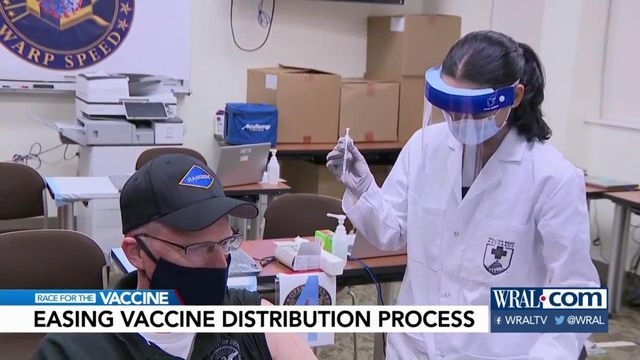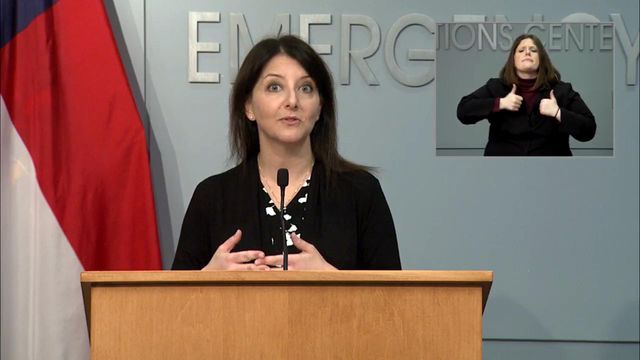Vaccination priority list shuffled again as people 65 or older now eligible
Allowing people 65 or older to get vaccinated against coronavirus would open the vaccine up to as many as a million more people in North Carolina. That's far more than the state has doses on hand for, so administering the shots may take weeks or longer.
Posted — Updated"We’re going to be opening up the criteria for people 65 and over," Cooper said during a virtual gathering of the North Carolina Association of County Commissioners. "So, not only people 75 and over will be able to get a COVID-19 vaccine now, but ... those 65 and over will be, along with health care providers.”
Instead of Phase 1A, several groups in Phase 1B and so forth, the state now has five priority groups:
- Health care workers and residents and staff of long-term care facilities
- Adults ages 65 or older
- Frontline essential workers
- Adults at high risk for exposure or increased risk of severe illness
- Everyone else
Adding the younger age set of people to those 75 and up, whom various counties started vaccinating last week, would open the vaccine up to as many as a million more people in North Carolina immediately. That's far more than the state has doses on hand for, so administering those shots may take weeks or longer.
"Providers that are ready" and have available doses can start vaccinating people ages 65 to 74 immediately, Department of Health and Human Services Secretary Dr. Mandy Cohen said at an afternoon news conference. But she repeatedly reiterated that demand will continue to far outstrip vaccine supply for weeks.
"Many folks will have to wait before vaccine is available for them," Cohen said, noting that the state receives about 120,000 doses a week.
"When he got his, I was really wanting to get mine, you know, because it’s been almost a year since our lives have changed so dramatically," McNeill said. "I’m going on Sunday morning. I’m so excited."
Whether she can actually get vaccinated then is another issue, however.
"We are a faucet here," said Dr. David Wohl, an infectious disease expert at UNC Health. "We can turn the knob and vaccinate more people – we can, we know how to do that – but what we do need is more vaccine."
Cohen said the revised priority list is designed to achieve "simplicity and speed," which are the two primary focus points for federal officials in the nationwide vaccination push.
"We want to make sure [no one is] held back. We know providers are at different points, so that flexibility is important," she said.
The shift won praise from the state's top Republican, Senate President Pro Tem Phil Berger, who had criticized the initial priority list as overly complicated and with some steps – including the attention to college campuses – out of order.
“There still may be an awful lot of young, healthy people who fall under the very broad range of ‘essential workers’ who might go before people in their 50s and 60s who face a much higher risk of death, but this is a big move in the right direction and I’m happy about it,” he said in a statement to The Associated Press.
Cohen also said different public-private vaccination partnerships are in the works, such as one in the Charlotte area involving Atrium Health, Honeywell and the owners of the Charlotte Panthers and Charlotte Motor Speedway.
"We're going to need different approaches in different places in the state to make sure that we can have vaccine access points across our state that also allow us to get to that level of speed that we want," Cohen said, adding that the effort is restricted only by supply limitations.
"It's not going to be something that can run 24/7. We just don't have that amount of vaccine," she said.
What the state does continue to have, however, are surging numbers of people infected or hospitalized with or dying from coronavirus.
The state reported another 9,853 infections on Thursday and has averaged nearly 8,600 new cases a day over the last week. A record 3,990 people are being treated for COVID-19 in hospitals statewide – about a quarter of all hospital patients – and a record 858 are in intensive care units.
More than 7,800 North Carolinians have died from the virus since the pandemic began last March, including 80 deaths reported Thursday.
Federal officials also advised states this week not to hold back any of their weekly vaccine allotments to provide second doses to people and instead give as many people a shot as possible. Both of the approved vaccines require two doses a few weeks apart.
But Cohen said North Carolina officials are waiting on more guidance about getting people their second doses in time if providers start using what has been on reserve to provide first doses to others.
Cooper: County officials need to set example
Health departments have criticized that system as time-consuming and clunky, but the data sent back to the state is used to determine future vaccine allocations. Cooper encouraged county governments to ask for whatever help they need, including the logistics of appointment-setting and data entry.
He also asked county commissioners to set a good example by wearing masks and practicing distancing.
“The next few months are going to be tough," Cooper said. "Regardless of how many people we vaccinate, we know that we will not be able to get the acquired immunity for several months. So, our prevention efforts are more important than ever. I ask you all to set examples."
He also reiterated a suggestion that they pass local ordinances to enforce masks and other mandates he's handed down from the state level. Some have criticized the governor for sending out statewide edicts but leaving it to local authorities to enforce them or leaving them largely unenforced.
"We ask your sheriffs and others to help us with this, because we can save lives," Cooper said.
Related Topics
• Credits
Copyright 2024 by Capitol Broadcasting Company. All rights reserved. This material may not be published, broadcast, rewritten or redistributed.






